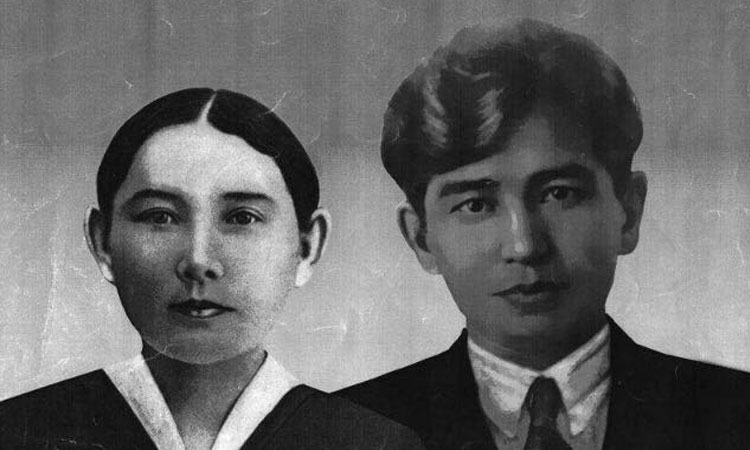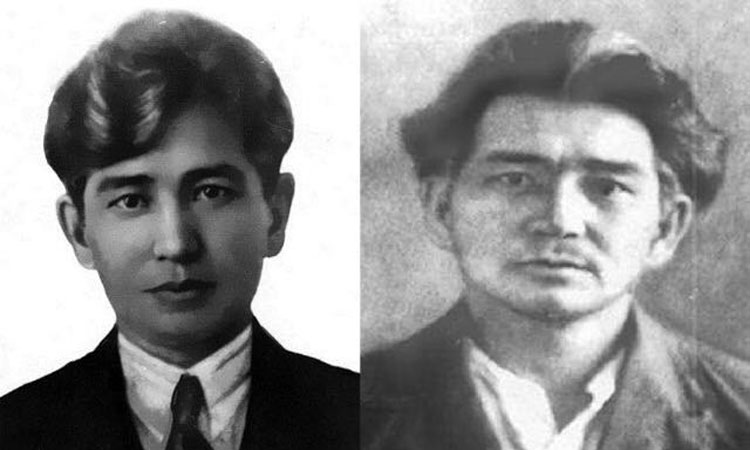KUDAIBERGEN KUANOVICH ZHUBANOV
19.12.1899 – 25.02.1938
As you can guess
a pacer or a wind-footed steed by the first gait,
so can the first steps of Kudaibergen Zhubanov
in life, they let you know who he is and
what it feels like his purpose in society
Mukhtar Auezov
Kudaibergen Kuanovich Zhubanov is the first Kazakh philologist, scientist, public and statesman, one of the organizers of the first Kazakh Academy, a branch of the USSR Academy of Sciences, who laid the scientific foundation of Kazakh linguistics and the foundations of Kazakh professional science.

Kudaibergen Kuanovich Zhubanov was born on December 19, 1899 in the village of Akzhar, Temir-Argayash parish, Aktobe region (now Mugalzhar district) Aktobe region. He graduated from the Oriental Institute of the Tipi named after Yenukidze was born in Leningrad in 1928, and in 1929-1932 he studied at the postgraduate school of the same institute, and a year later he transferred from there to the postgraduate school of the Institute of Language and Thought at the USSR Academy of Sciences. In 1932, he completed postgraduate studies in the specialties “Turkic languages” and “general language education”.
During his short life, Kudaibergen Kuanovich Zhubanov knew Persian, Arabic, German, Turkish, Mongolian, Georgian, Chuvash, Komi, Russian and many Turkic languages very well. Later, he began to study Japanese in order to read the data in which the keys to science were hidden in Chinese and translated into Japanese, setting himself the goal of learning Chinese in the future, but these plans were not realized.
Since childhood, together with his uncle Tagybergen Zhamashovich Kudaibergen Zhubanov, who took part in the meeting of the leaders of “Alash”, deeply understood their ideas, and later he published articles in the newspapers “Kazakh”, “Alash”, “Kosem” and the magazine “Tulip” under the pseudonym marginal and November boy. He was the first initiator of the publication of the youth handwritten magazine of the young Kazakh intelligentsia of that time. for example, “Tez” in Elek, and then “Ai” in the city of Temir.
Kudaibergen Zhubanov began his career in 1918 as secretary of the Council of the municipality, after which he gradually moved into the field of education and science.
In parallel with his work, Kudaibergen Zhubanov studies languages with great interest, and also reads works on psychology, pedagogy, logic and reflexology with interest.
He graduated from graduate school, from 1932 to November 1937 he was a professor at the Kazakh Pedagogical Institute and simultaneously worked as the head of the Department of Kazakh Language and Literature along with scientific, pedagogical, state and public activities.

From 1933 to 1937 he worked as a member of the board, head of the sector of methods, programs and textbooks, head of the Commissariat of Public Education of the Kazakh SSR, as well as chairman of the State Terminological Commission of the Kazakh SSR and editor-in-chief of the Bulletin of Gostermink.
In 1936-1937, he was the head of the linguistic sector, a member of the Academic Council, a member of the Presidium of the Kazakh branch of the USSR Academy of Sciences, as well as the editor-in-chief of the Academic Dictionary of the Kazakh language.
From 1935 to 1937, he was a member of the Academic Council of the Kazakhstan National Institute of Culture and a member of the All-Soviet Central Committee on the New Alphabet (Latin).
In 1935, Kazakhstan was elected a member of the Central Executive Committee, became a delegate to the VI All-Russian Congress of Soviets, and was awarded the Badge of Honor “15 years of Kazakhstan”.
On November 19, 1937, he was arrested on charges of being an “enemy of the people”, he was on February 25, 1938 – the first day of mass shootings of famous state and public figures of Kazakhstan.
On October 3, 1957, he was acquitted of no crime.
PUBLICATIONS ON THE SCIENTIFIC INTERESTS AND LEGACY OF KUDAIBERGEN ZHUBANOV AND HIS WORKS
The scientific legacy of K. K. Zhubanov covers a wide range of theoretical and practical issues, many of which are still waiting for a solution in front of Kazakh science. In the history of Kazakh linguistics, he is recognized as the author of the first monographic works on the Kazakh language, literary studies, and pedagogy. The works of Kudaibergen Zhubanov are characterized by a comparative historical method of studying the problem of Turkic languages.
Kudaibergen Zhubanov is one of the first textbooks written for grades 5-7 of Kazakh secondary schools, the grammar of the Kazakh language, according to Soviet academic turkologist S. E. Malov, was the author of the best project of the Kazakh alphabet based on the Latin alphabet of that time, as well as numerous practical developments on the development of Kazakh linguistics and Kazakh culture.
Scientific ideas of Kudaibergen Zhubanov formed the basis of research works of the modern generation on the Kazakh language, literature, philosophy, pedagogy and psychology, dozens of scientific monographs, PhD, master’s and doctoral dissertations, as well as scientific articles and reports, special courses in humanities, as well as the scientific conference “Zhubanov taglymy”.
THE MAIN DATES OF THE PROFESSOR’S LIFE
ZHUBANOV KUDAIBERGEN KUANOVICH
He was born in 1899 (December 19) in the village of Akzhar, village No. 9, Temirsky district (now Mugodzharsky) of Aktobe region.
He received his primary education at a local school, then at the Khusainiya madrasah in Orenburg 1914-1916, at the Jurun 2nd grade Russian school (1916-1917), at the 2nd grade college in Iletsk (1917-1918).
Education is higher. Graduated from the Leningrad Institute of Living Oriental Languages in 1928 (external); 1929-1932. studied at the graduate school in Leningrad:
– 02.1929-09.1930 (1.5 years) – at the Institute of Oriental Languages (Turkic languages);
– 10.1930-09.1932 (2 years) at the Institute of Language and Thought of the USSR Academy of Sciences (general Linguistics).
In addition to Kazakh and Russian, he spoke the following foreign languages: German, Persian, Arabic, Turkish, Mongolian, Georgian, Chuvash, Komi and Turkic languages.
Job Information:
- 10.1918-04.1920 Temirsky district, Kuldzha-Temirsky Volost Council of Deputies. – Secretary of the State Department, later – Chairman;
- 1920-1922 Temirsky Sobes (Soviet control);
- 1922-1923 Temirsky RICK (member of RICK);
- 1923-09.1925 Temir District Department of Public Education (UNRO) – Inspector;
- 1925-12.1928 Aktobe GubONO – methodologist inspector;
- 1928 Kazakh State University (later KazPI) – researcher at the Department of Turkology. Almaty city;
- 1932-11/20/1937 Kazakh Pedagogical Institute (KazPI) — Head of the Department of Kazakh Language and Literature, Professor. Almaty;
- 1933-11/20/1937 People’s Commissariat of Education of the Kazakh SSR – member of the Board, head. sector of methodology, programs and textbooks, Chairman of the UMSa, Chairman of the State Terminological Commission of the Republic, editor-in-chief of the Bulletin of the Gosterminkom (1935), Almaty;
- 1935-20.11.1937 Kazakh branch of the USSR Academy of Sciences – Head of the linguistic sector, Editor-in-chief of the Academic Dictionary of the Kazakh Language, member of the Academic Council of the Kazakh Branch of the USSR Academy of Sciences, member of the Presidium of the Kaz FAN of the USSR;
- 1935-1936 Member of the Scientific Council of the Kazakhstan Institute of National Culture;
- 1935-1937. Member of the All-Union Central Committee of the New (Latinized) alphabet;
- He was elected: a member of the Temir Committee (1922), a member of the KazTSIk (1935), a delegate to the 16th All-Russian Congress of Soviets (1935).
- He was awarded the Badge of Honor “15 years of Kazakhstan”.
Additional information about X. K. Zhubanov.
He was arrested on November 19, 1937, and shot on February 25, 1938 in Alma-Ata (the first day of mass shootings by decision of the visiting “troika”).
Rehabilitated: in civil terms — 03.10.57, in party terms – 22.02.58.
